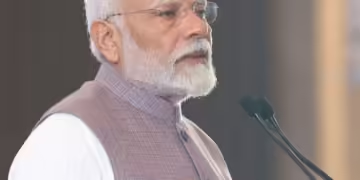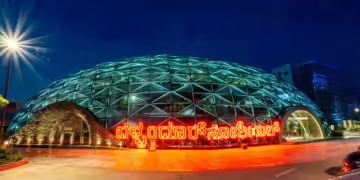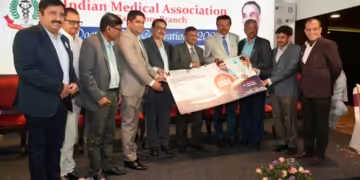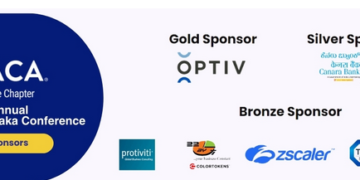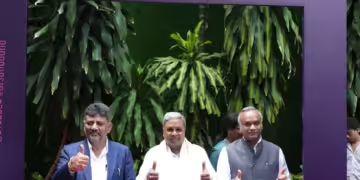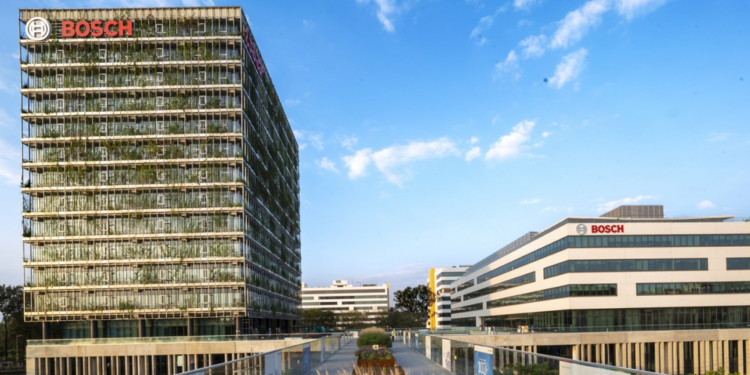14.02.2023 Quarter 03.2022–2023 financial results
- Total revenue from operations in Q3 of FY 2022–23 up 17.7% over the same quarter of previous year.
- Profit after tax stood at 8.7% of total revenue from operations.
- Interim dividend of INR 200 per share declared for FY 2022-23.
- Bosch Limited has been recognized as a Great Place to Work-Certified™ company for the third consecutive year.
- Bengaluru, India – Bosch Limited, a leading supplier of technology and services, posted total revenue from operations of INR 3660 crores (415 million euros) in Quarter 3 of FY 2022–23, an increase of 17.7% over same quarter last year. The revenue from operations in this quarter has been flat compared to the previous quarter due to decline in net sales resulting from seasonal impact in the passenger car and tractor sales which has been offset by higher income from services and other operating revenue.
The Profit Before Tax (PBT) stood at INR 425 crores (48 million euros) which is 11.6% of total revenue from operations, an increase of 26.4% increase over the same quarter of previous year. The Profit After Tax (PAT) stood at INR 319 crores (36 million euros) which is 8.7% of revenue from operations. The Earnings Before Interest and Tax (EBIT) in this quarter, at INR 295 crores (33 million euros), has reduced by 12.9% compared to the previous sequential quarter impacted by one time costs like warranty claims and adverse exchange rate.
In quarter 3 of FY 2022-23, the Board of Bosch Limited has declared an interim dividend of INR 200 per share; primarily driven by healthy turnover and strong liquidity situation.
“A number of macroeconomic factors will make 2023 a challenging year. There are possibilities of a global recession, and India will not be immune to these impacts. Despite these uncertainties, the revenue for the current quarter is in line with the estimated quarterly forecast. With a strong performance across all quarters this fiscal year, Bosch will continue on a strong growth trajectory and focus on optimizing its costs to deliver continued profitable growth and cash flows in the future,” said Soumitra Bhattacharya, Managing Director, Bosch Limited and President of the Bosch Group in India
-
Snapshot of performance in Quarter 3
The auto market in India has seen a lot of fluctuation in the recent past. Despite the challenges, India overtook Japan to become the world’s third largest auto market in 2022. The automotive market in Quarter 3 witnessed a strong Y-o-Y growth on account of improved market demand. The Powertrain Solutions business which constitutes more than 60% of the total net sales showed a robust growth of 31.1% over same quarter of previous financial year outperforming the overall automotive market growth. This has resulted in a Y-o-Y increase of 21.2% in the product sales of the automotive segment.The global semiconductor supply chain continues to be in a tight situation. Lower inventory levels combined with frequent and unpredictable disruptions could have a sharp impact in the near future. Although the crisis is far from over, the easing of the chip shortage, particularly in the recent months, has led to a significant recovery in sales in the two-wheeler business, up 31.7% compared to the same quarter last year.
The Beyond Mobility business, driven by continued growth in consumer products, recorded a 2.9% increase in net sales over same quarter of previous financial year.
The solid overall automotive market growth also purposed the expansion of Bosch Car Service Network to 500 centers, making it the fourth largest car service network in India. The Power tools business reached an all-time high, with an overall growth of 20% in 2022, with cordless segment making a double-digit contribution of over 10% for the first time.
Continuing on the growth story, Soumitra Bhattacharya, Managing Director, Bosch Limited and President of the Bosch Group in India said, “The recent budget is a testament to the government’s intent to drive sustainability and focus on green growth in India. Bosch is also spearheading this change by building an ecosystem for new-age technologies in the mobility space. In addition, the government’s efforts to build a robust transport infrastructure will also drive further growth in the Indian automotive market.”




